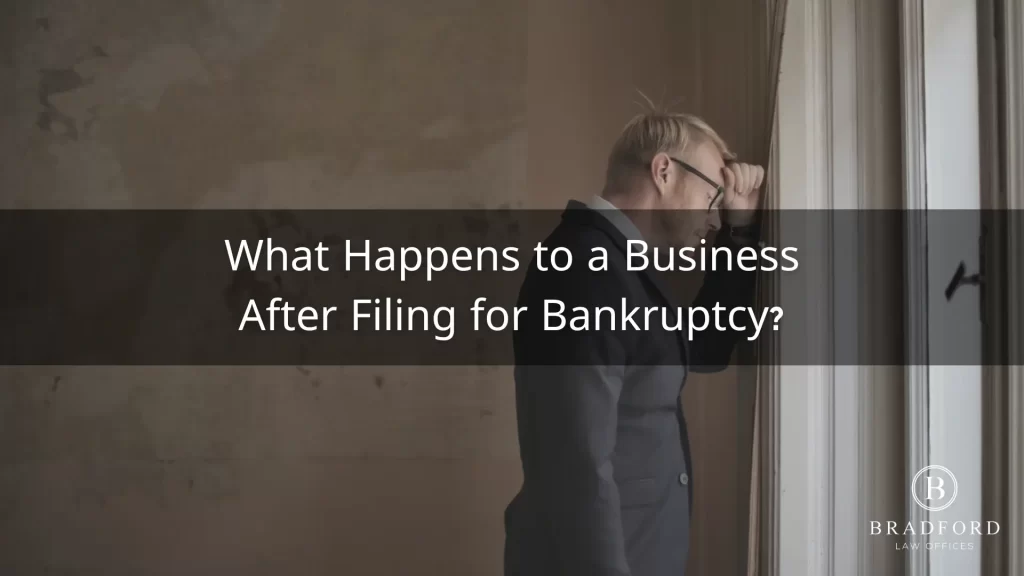
The effect of bankruptcy on a business depends on what entity it is and what type of bankruptcy was filed. Depending on the type of bankruptcy that you choose for your business, you may be required to wind down your business, be able to eliminate certain debts, or even modify how and when the debt is paid so that the business can remain operational.
The Raleigh business bankruptcy attorney of Bradford Law Offices has over 25 years of experience in bankruptcy law. Contact us today at (919) 758-8879 or reach out to us online to discuss your options and the implication each option has on your business.
Chapter 7 Bankruptcy
Chapter 7 bankruptcy is known as liquidation bankruptcy. This chapter of bankruptcy can allow businesses to have a portion, or most, of their debts discharged at the end of a bankruptcy proceeding. Under Chapter 7 bankruptcy, a business will be able to wind down its operations by liquidating its assets and distributing the proceeds to its creditors. As a result, if you do not plan to shut down, Chapter 7 bankruptcy may not be the best option for your entity.
Chapter 11 Bankruptcy
Chapter 11 bankruptcy is known as reorganization bankruptcy and is most commonly used by businesses that cannot pay their debts on their current payment schedule. This chapter of bankruptcy allows corporations, small businesses, and individuals to liquidate certain assets to pay their debts or create an agreement with creditors that will enable the business to remain operational while its debts are being paid down.
 Chapter 12 Bankruptcy
Chapter 12 Bankruptcy
Chapter 12 bankruptcy is reserved for farms and fisheries struggling to stay afloat financially. Chapter 12 bankruptcy allows the filer to keep their assets while making payments in accordance with a court-approved debt repayment plan.
To be eligible for Chapter 12 bankruptcy, a family-owned farm or corporation that owns a farm must meet specific criteria, such as not appearing for a separate bankruptcy claim in the last 180 days, attending the required pre-bankruptcy credit counseling, and earning a regular income. In addition, a family-owned farm qualifies for Chapter 12 bankruptcy if they also meet the following criteria:
- An individual or married couple owns a farm that is actively involved in commercial farming operations. Unmarried individuals who are acting as business partners may not file jointly together.
- The commercial farming operations result in at least 50 percent of the farm’s gross annual income.
In addition to being required to take credit counseling and not appearing for a separate bankruptcy proceeding within a certain timeframe, to be eligible for Chapter 12, these criteria must be met:
- The farm is not publicly traded.
- At least half of the farm is owned by a single family or a group of relatives.
- The single-family or relatives are on staff working at the farm.
- At least 80 percent of the business value comes from farming-related assets.
- At least 50 percent of the business’s debts resulted from the operation of the farm.
The goal of Chapter 12 bankruptcy is for a farm or fishery to remain open for business while paying down its debts and remain open afterward.
Chapter 13 Bankruptcy
Chapter 13 bankruptcy is limited to sole proprietors and unincorporated businesses because it is not intended to be used to protect business assets. Instead, it is meant to protect individual assets. Chapter 13 bankruptcy allows someone who is a sole proprietor or runs an unincorporated business to enter a repayment plan to pay down their debts while protecting their assets, including their business assets. Under Chapter 13 bankruptcy, an individual can keep running their business without liquidating their assets.
Is There Personal Liability for Business Debt in Bankruptcy?
In some situations, individuals may be personally liable for business debts. Therefore, before filing a bankruptcy petition, it is important to understand whether an individual will be found personally liable for business debt.
As a sole proprietor, you may be personally responsible for all the business’s debt, as it’s likely in your name. Additionally, some people have a personal stake in their limited liability companies or corporations, which may result in personal liability for business debt.
Contact Us Today
If your business is struggling to pay its employees and bills, help may be available. Our experienced Raleigh business bankruptcy attorney at Bradford Law Offices can help you find relief. Call us at (919) 758-8879 or contact us online today to discuss the options for reducing or eliminating debt owed by your business and whether there is a risk of personal liability.
 Chapter 12 Bankruptcy
Chapter 12 Bankruptcy